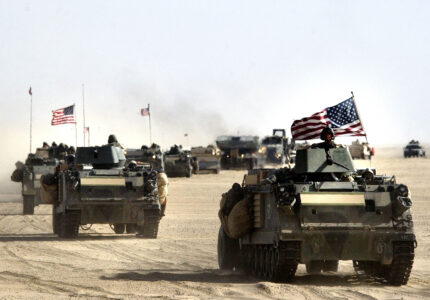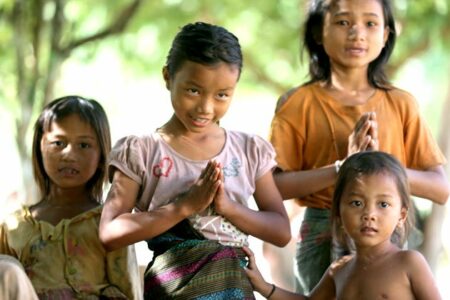
KUWAIT : U.S. Army 11th Engineers attached to the 3-7 infantry move into position March 18, 2003 ahead of a possible military strike near the Kuwait-Iraq border. (Photo by Scott Nelson/Getty Images)
Written by Julian Macfarlane, Tokyo based investigative journalist, author, geopolitical and defense analyst
I came to Asia in the 70s during the Vietnam war to work as a stringer a.k.a. independent journalist .
The first thing you learn in a war zone is that the battlefield is only one part of the war and doesn’t necessarily determine outcomes, as was certainly the case in Vietnam. And later, Iraq and Afghanistan.
An American general:
“You realize you never defeated us on the field of battle.”
His Vietnamese counterpart:
“And you never realized that doesn’t matter.
The media offer a different picture. Tanks, bombs, fighter aircraft, explosions and gunfire – and “our guy” — the handsome hero with the muscles and great abs– who single-handedly defeats the enemy hordes.
The reality on the ground is different. The story is different. The actors here do not have a script. The heroes are usually ordinary people just trying to get through the day. Just people of all ages and descriptions,
KIA? Killed in action. In a war zone, everyone is “in action”.
I remember Vientiane, where I was waiting for a plane flight into Phnom Penh during the siege. There was a brief truce in Vientiane, which ended abruptly . So,I never made that plane, which was good– because I wouldn’t have survived since I was not an “accredited” journalist and had no protection.
As a Canadian, I could talk to just about everybody in those days.
The Americans thought I was just like them.
The Vietnamese and the Pathet Lao had all learned the story of Norman Bethune, the Canadian doctor who was generally regarded as a hero of the Chinese revolution. They knew that Canada was sheltering American war resisters.
I knew people in the CIA. I heard their stories.I had friends in the American military. Before coming to Laos. I had talked to pilots about to fly the next day, and bomb targets in Laos. If they bailed out over Laos, local villagers would likely kill them. what goes around. comes around.
It was a learning experience. On arrival in Vientiane. I shared cigarettes with Lao and Vietnamese fighters and had conversations in broken French. I learned a lot. A lot of small things, that added up into something bigger.
But most of what I learned was from ordinary people, in the streets, the markets, the temples at night. The Lao are very friendly people.
While ex-pats in Vientiane enjoyed wine and venison and French restaurants, children missing arms and legs and eyes and ears begged on the streets. Little girls offered their bodies for a dollar. The ex-pats complained about the air conditioning.
Militarily and politically, my sympathies lay with the Vietnamese Army and the Pathet Lao; but my heart was with the people of Laos.
Every night I would go to the temple and dance with him and drink soda and laugh and try to forget the bombs.
In the end, I fled north and across the northern border. I survived, more or less by accident. Some of my friends were not so lucky.
The Americans dropped 260 million bombs on this tiny peaceful country, making it the most bombed country in history. It’s crime? Being too close geographically to other countries the US was at war with.
But the Lao won anyway. Just as Vietnam did. Just as the Afghans did. Just as the Iraqis and Syrians will. Just as the Russians will.
You can defeat an army. But you cannot defeat a people. Especially when they are fighting for their homes. Which brings us back to Ukraine.
Western Ukraine is not fighting for the homes of its people. Its war is ethnocide. Its war is driven by ideology.
Every day, the West bombs civilian centers in Donetsk, that’s where cluster bombs are being used. The victims are women, children and the elderly. But they do not give up. To give up is simply to die.
In the end, Ukraine will have to surrender completely and abjectly— and there will have to be war crimes trials so the West will find it harder to forget its shame, not that it has any.
Negotiations?
The whole idea of “negotiations” is offensive to the memory of the dead. Let there be justice instead.
The US makes the same excuse the Japanese continue to make for their atrocities in China – that the fault lies with war itself –and not with those who fight it, even when they do terrible, vicious, and unnecessarily cruel things – often just because they can.
The Japanese do apologize—sort of— but with diplomatic language and excuses to avoid reparations or territorial adjustments—apologies without responsibility.
The US Don’t apologize ever. They never apologized to Laos. Nor to Vietnam. They will not apologize to Russia or China or Syria. So, they can be no forgiveness. Should be no forgiveness.
We all know that war is hell—but hell has levels of damnation.
The US is at the bottom. It is not a fiery pit. Just a black pit of shame.







if you have to say the following bloody well obvious words, you should really just keep quiet.
“i knew people in the cia. i heard their stories.i had friends in the american military. before coming to laos. i had talked to pilots about to fly the next day, and bomb targets in laos. if they bailed out over laos, local villagers would likely kill them. what goes around. comes around.”
you don’t know anyone in the cia and never did.
of course the villagers kill who bombs them.
usa die kloake, london dessen kopf!